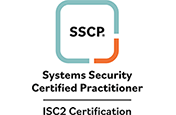Unable to find what you're searching for?
We're here to help you find itSystems Security Certified Practitioner (SSCP) Course Overview
The SSCP course is a foundational training program designed for IT professionals seeking to showcase their knowledge in the field of security. This course equips learners with the skills needed to implement, monitor, and administer IT infrastructure in accordance with established cybersecurity policies and procedures that ensure data confidentiality, integrity, and availability. The training covers various aspects of security operations, including Access controls, Risk identification, incident response, Cryptography, network security, and Systems and application security. By completing the SSCP Certification, individuals demonstrate their technical ability to tackle operational security challenges and adhere to best practices. It is an excellent stepping stone for those aspiring to build a career in cybersecurity and provides a comprehensive understanding necessary to protect organizations against cyber threats.
Purchase This Course
USD
View Fees Breakdown
| Course Fee | 2,990 |
|
Total Fees (with exam) |
2,990 (USD) |
USD
View Fees Breakdown
| Course Fee | 2,300 |
|
Total Fees (with exam) |
2,300 (USD) |
USD
View Fees Breakdown
| Flexi Video | 16,449 |
| Official E-coursebook | |
| Exam Voucher (optional) | |
| Hands-On-Labs2 | 4,159 |
| + GST 18% | 4,259 |
|
Total Fees (without exam & Labs) |
22,359 (INR) |
|
Total Fees (with Labs) |
28,359 (INR) |
Select Time
Select Date
| Day | Time |
|---|---|
|
to
|
to |
♱ Excluding VAT/GST
You can request classroom training in any city on any date by Requesting More Information
Inclusions in Koenig's Learning Stack may vary as per policies of OEMs
Scroll to view more course dates
You can request classroom training in any city on any date by Requesting More Information
♱ Excluding VAT/GST
*Inclusions in Koenig's Learning Stack may vary as per policies of OEMs
Suggestion submitted successfully.
Koenig Learning Stack
Inclusions in Koenig's Learning Stack may vary as per policies of OEMs



